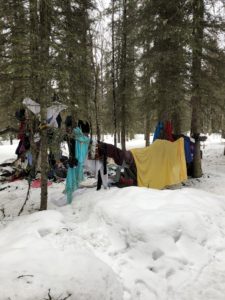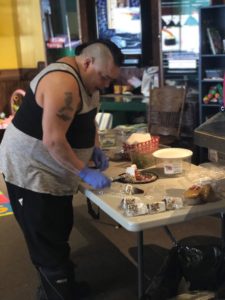 [1]
[1]Sleds piled high with up to ninety pre-cooked meals were pulled by hand several times this winter through feet-deep snow to the hundreds of homeless living in the woods around Kenai and Soldotna, southwest of Anchorage, Alaska.
Southern Baptists did the pulling, after the word went out to “shelter in place” and establishments closed that had provided some measure of sustenance and supplies for people who live in thin-skinned tents and rusted-out vehicles.
“Here in Kenai our staff and volunteers discovered multiple homeless camps with a couple hundred people living in tents that no one knew existed,” Jim Hamilton told SBC LIFE before describing several action plans for the next year.
Hamilton is executive director of Arctic Barnabas, a ministry providing pastor and missionary care to 148 ministry families in 114 villages in Alaska and Northwest Canada. He became aware of the number of “broken” people in the Kenai area, people who would benefit from a recovery ministry.
Hamilton approached the CEOs of several non-profit ministries he meets with for weekly strategic development “Lunch and Learn” gatherings. When no one else took on the task, he did it himself as a ministry of College Heights [Southern] Baptist Church in nearby Soldotna, where he is a member.
“I was waiting for somebody to step up and reach our recovery and re-entry community for Christ but God was convicting me to lead the charge. I finally realized my name was ‘somebody’,” Hamilton said. “I just can’t get away from helping the at-risk population and planting churches to reach people on the fringe. I quickly found partners in my home church and with the Alaska Baptist Resource Network.”

In about a year, Set Free Ministries had grown pre-pandemic to eighty-plus for Saturday evening gatherings; to a younger site in Wasilla that’s even larger; and a third in Anchorage on tap to be started with a NAMB-approved planter this fall.
These are the first three in a statewide Set Free Alaska Network that could reach to a dozen or more recovery-based church plants in the years to come, Hamilton said.
The ministry to the homeless is a separate yet related outreach to a subculture outside society’s mainstream that came about in the wake of the COVID-19 pandemic.
“Being homeless is a choice for many people here,” Hamilton explained. “They’re pretty self-sufficient until a major crisis happens like COVID-19, and the places they depend on for help close down.”
In addition to food, this includes dumpster-diving in commercial trash bins for items that might be useful, such as material that can be burned for heat, clothing or items to repurpose, or something broken that can be fixed and sold for a few dollars.
“Next year as part of our Winter Readiness Plan we’re going to start a tent park inside a huge warehouse building,” Hamilton said about the continuation of a ministry to the homeless. “It will function similar to an RV Park. People will pay a dollar a night or a few bucks a week. If we rent the space and turn it into a business, we won’t have government restrictions that a not-for-profit would have.”
He’s also looking for two large buses that can be retrofitted, one as a mobile feeding station and the other a warming center, that could travel “almost like a bus route” to places near the homeless encampments where people congregate for some measure of safety and/or sociability.
This year Set Free volunteers are distributing hygiene kits, socks, and seasonal clothing, plus hot coffee, meals to go at the community center door during COVID-19, and relational chat leading to spiritual conversation.
As the weather warms—Mother’s Day is the target date—a mobile shower trailer from a partner ministry organization will be on-site in the parking lot at the Set Free Community Center/Church in Kenai.
“As soon as the snow is off and the government lifts the ‘shelter in place’ restrictions, we will have a post-Easter festival on our parking lot,” Hamilton said. “We’ll bring out our horse trough and have multiple baptisms.”
One couple couldn’t wait.
“We did baptize a couple on Easter,” Hamilton said. “They said they wouldn’t wait. On the day they celebrated their nineteenth anniversary, the guy said, ‘I’m going to get baptized if I have to cut a hole in the ice, because I told God I would.’
“We didn’t want him to do that—so we filled our horse trough—with cold water,” Hamilton added. “One of our pastors baptized him and his wife with a few of us in the room. It was a big hallelujah moment.”

Now that it’s warming up, each day for three hours Set Free Ministries grills burgers and chicken on a commercial broiler grill and tosses hand-cut fries into a propane-fueled deep fryer for the homeless and whomever wants a free meal or wants to leave a donation.
The Set Free Community Center/Church is in a former pool hall. Five pool tables remain. There’s also a cafe area with meals served three times a day, dart board, and Christian music, and everything is staffed by volunteers.
“It’s a spot that creates relevancy for people,” Hamilton said. “When you look at the ministry of Jesus, He tended to gravitate to the under-served population in his culture. That’s part of what the church is supposed to be doing.”
Set Free Ministries consists of the community center, church, recovery services, men’s and women’s sober living homes, and church planting.
In Kenai, the Set Free Sober Living House is full with ten residents. The women’s facility has four to begin with, expecting a full complement of eighteen women within months.
Sober Living includes a structured discipleship program designed to “move them from where they are to being Christ-centered and self-sufficient,” Hamilton said. “We teach the Bible for life change. We’re teaching people to filter the Bible through God’s directive. It accelerates transformation when you listen for direction not just information.”
The three-hour Saturday service includes a “gathering time” meal, worship service with Christian music with lyrics that appeal to broken people, testimony and message, and “hangout” time following.
“We give an altar call because people are looking for intervention right now, and the only real intervention that works is Christ,” Hamilton said.
In Wasilla, birthed nine months ago, one hundred people pre-pandemic packed into a gathering space big enough for not much more than half that many, but they stand at the back of the room and keep coming back for a straight-up Gospel. The ministry just purchased and opened a property that will house twenty released prison inmates.
A former Marine and his family plan to launch the Set Free Anchorage campus this fall.
Other future Set Free Ministries cities include Homer, Seward, Fairbanks, Palmer, Juneau, “and some hub villages like Nome and Bethel,” Hamilton said. “If those villages could be impacted with the Gospel with a recovery model church, it would impact all the smaller villages around them in their region.
“We’re not your momma’s church but your momma’s welcome,” Hamilton said about all Set Free Alaska churches. “There’s no judgment here. Grace, forgiveness, love, but accountability.”
What is Set Free Ministries?
“Set Free Ministries exist to help people find and follow Jesus,” Jim Hamilton explains. “The greatest need in recovery—where there is lots of different trauma—is to help people live a transformed life in Christ. The end result is not just about addiction recovery, helping people find a job, or meeting basic needs. It’s about seeing people set free from the bondage of sin through Christ. It’s about making disciples who help others find and follow Jesus.”
“Research shows people must have some level of psychological safety and predictability before people can move forward from their addiction,” Hamilton continued. “It’s just dealing with the reality that people are traumatized and severely broken. It’s the difference between a fracture and a compound fracture. People are broken in ways today like we’ve never seen. That’s the real pandemic: the brokenness that continues to spread.
“We have the antidote already: it’s the Gospel. This is the vaccine we all need. What we need is not more church; it’s Jesus. For years we invited people to church and kept losing ground, but church means nothing to people who don’t know Christ.”
